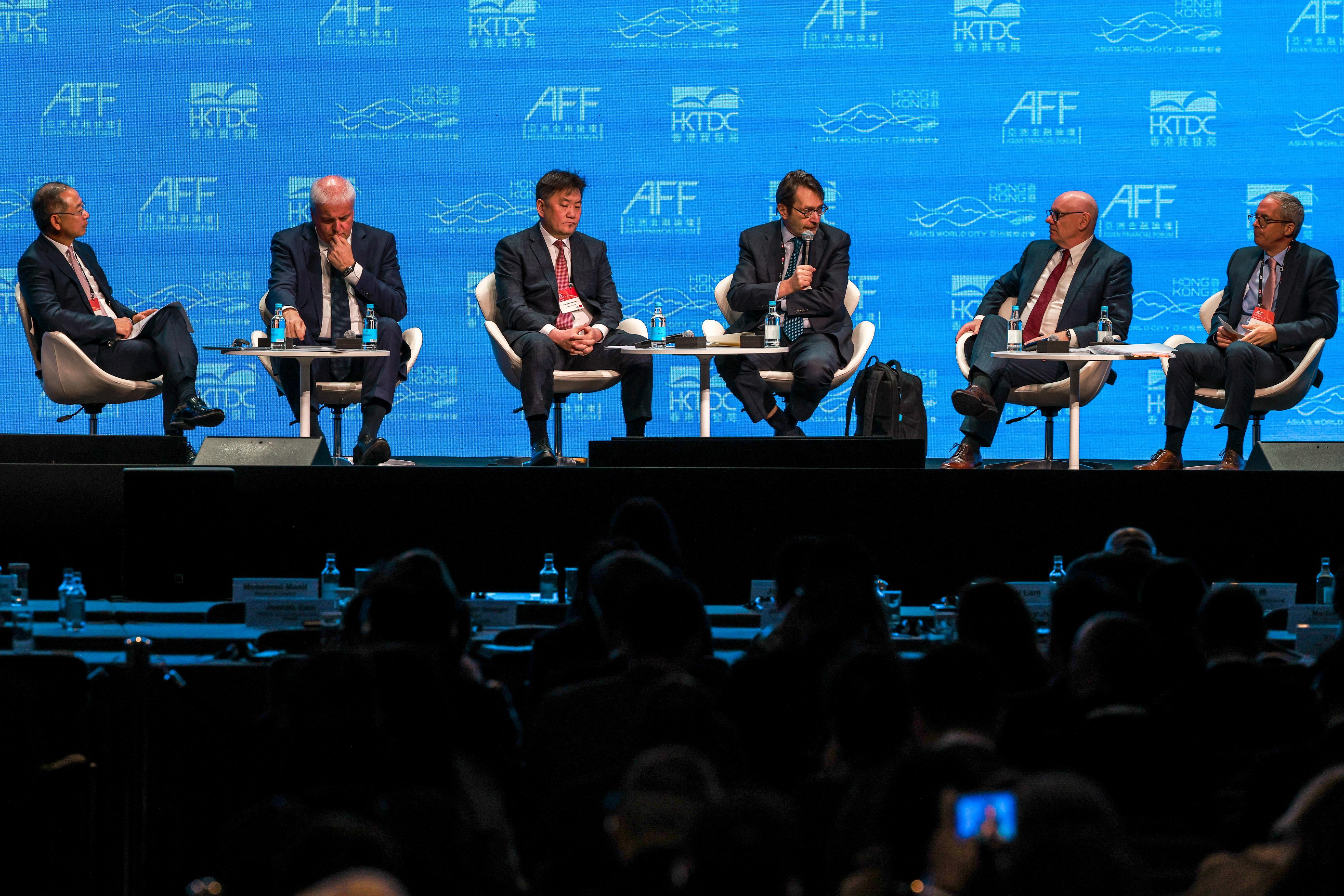 Thomas Helbling, deputy director, Asia and Pacific Department of the International Monetary Fund, speaks during a session titled “Policy Dialogue – Towards International Economic and Financial Cooperation” at the Asian Financial Forum at Hong Kong Convention and Exhibition Centre in Wan Chai, Jan 24, 2024. (ANDY CHONG / CHINA DAILY)
Thomas Helbling, deputy director, Asia and Pacific Department of the International Monetary Fund, speaks during a session titled “Policy Dialogue – Towards International Economic and Financial Cooperation” at the Asian Financial Forum at Hong Kong Convention and Exhibition Centre in Wan Chai, Jan 24, 2024. (ANDY CHONG / CHINA DAILY)
HONG KONG – With the global economy showing signs of recovery, collaboration on a wider scale and development of digital, green technologies will be key to maintaining sustainable growth, a panel heard on Jan 24.
The experts were discussing the issue of enhancing economic cooperation and stability and reducing risks during a session titled “Policy Dialogue – Towards International Economic and Financial Cooperation” at the 17th Asian Financial Forum.
READ MORE: HK, mainland to bolster financial regulatory cooperation
 Chief Executive of the Hong Kong Monetary Authority Eddie Yue Wai-man speaks during "the Policy Dialogue – Towards International Economic and Financial Cooperation" at the Asian Financial Forum in Hong Kong on Jan 24, 2024. (ANDY CHONG / CHINA DAILY)Hong Kong Monetary Authority Chief Executive Eddie Yue, who chaired the panel, said that international collaboration will be required more than ever because the world is confronting new challenges, including artificial intelligence and digitization.
Chief Executive of the Hong Kong Monetary Authority Eddie Yue Wai-man speaks during "the Policy Dialogue – Towards International Economic and Financial Cooperation" at the Asian Financial Forum in Hong Kong on Jan 24, 2024. (ANDY CHONG / CHINA DAILY)Hong Kong Monetary Authority Chief Executive Eddie Yue, who chaired the panel, said that international collaboration will be required more than ever because the world is confronting new challenges, including artificial intelligence and digitization.
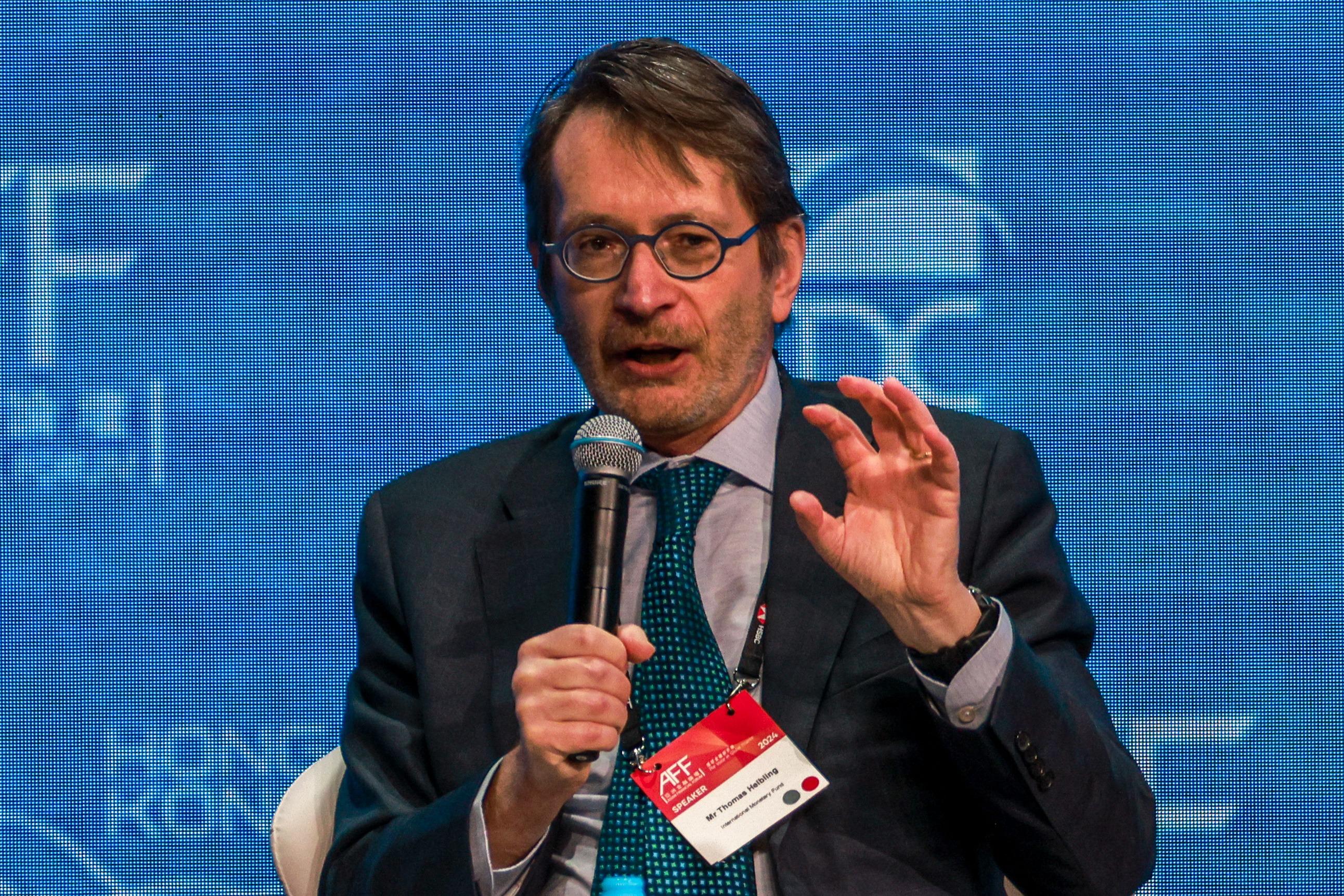 International Monetary Fund Deputy Director, Asia and Pacific Department Thomas Helbling speaks during the Policy Dialogue – Towards International Economic and Financial Cooperation at the Asian Financial Forum at Hong Kong Convention and Exhibition Centre in Wan Chai, Jan 24, 2024. (ANDY CHONG / CHINA DAILY)
International Monetary Fund Deputy Director, Asia and Pacific Department Thomas Helbling speaks during the Policy Dialogue – Towards International Economic and Financial Cooperation at the Asian Financial Forum at Hong Kong Convention and Exhibition Centre in Wan Chai, Jan 24, 2024. (ANDY CHONG / CHINA DAILY)
Thomas Helbling, deputy director of the Asia and Pacific Department at the International Monetary Fund, said that the global economy seems to be heading towards a soft landing and global growth will be stronger.
“In terms of resilience, I think the most important resilience has been in China,” he said. Looking forward, Helbling said that the situation in the Middle East is a concern.
“As soon as oil markets will be involved, then the risks are much higher,” he said, adding that an oil price spike poses substantial risks to global growth and inflation next year.
The use of technology for financial inclusion serves as a good case study to show how innovation can allow emerging economies, such as Mongolia, to advance digitization in areas such as payment service provision.
Such economies can be even more digitally enabled than advanced economies, the panel heard.
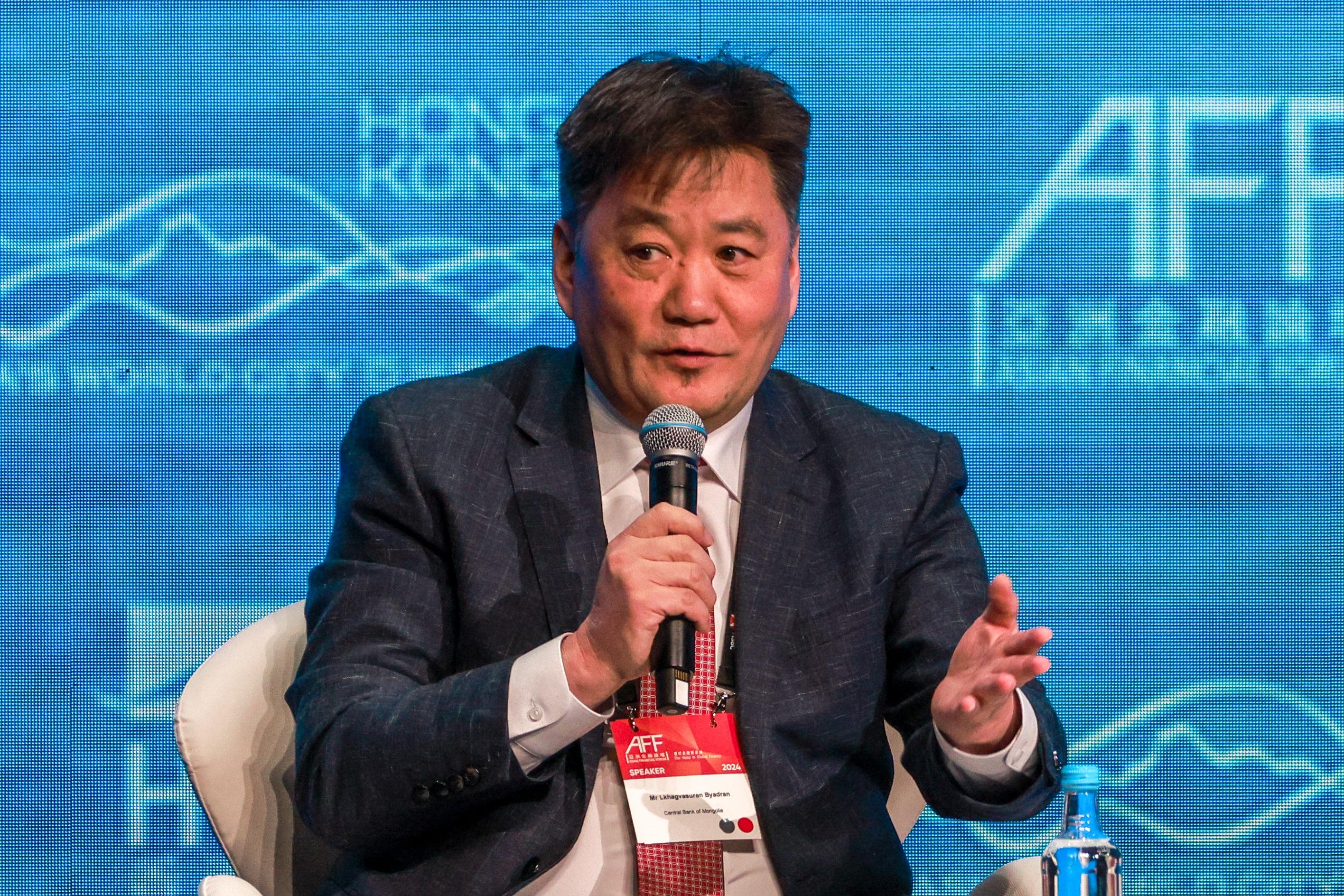 Governor of Central Bank of Mongolia Lkhagvasuren Byadran speaks during "the Policy Dialogue – Towards International Economic and Financial Cooperation" at the Asian Financial Forum in Hong Kong on Jan 24, 2024. (ANDY CHONG / CHINA DAILY)
Governor of Central Bank of Mongolia Lkhagvasuren Byadran speaks during "the Policy Dialogue – Towards International Economic and Financial Cooperation" at the Asian Financial Forum in Hong Kong on Jan 24, 2024. (ANDY CHONG / CHINA DAILY)
Central Bank of Mongolia Governor Lkhagvasuren Byadran explained how the country has navigated key opportunities and also the challenges presented by the current complex economic environment.
He said that, due to the geopolitical tension in the world, the Mongolian government developed its payment system, adding that fintech companies and start-ups are well supported in Mongolia to improve financial activities.
“Now our banking system is more based on those new technologies,” he said.
Digitization in Mongolia is improving rapidly. “Now, only 3 percent of the total money supply is cash in circulation,” he said, adding that people in Mongolia are used to digital instruments, noting even people in rural areas transfer money to each other via mobile phones.
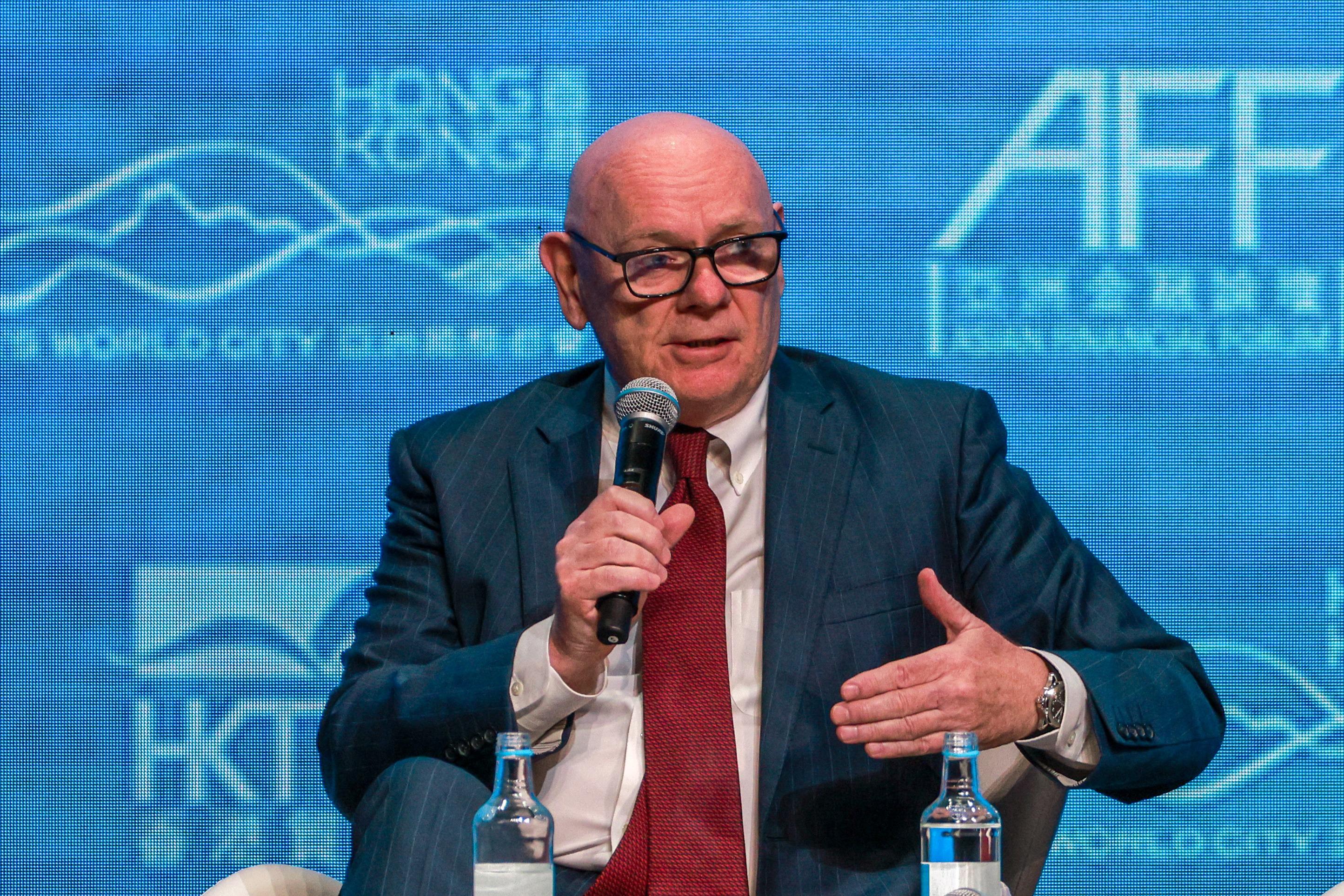 Chief Executive of Dubai Financial Services Authority Ian Johnston speaks during the Policy Dialogue – Towards International Economic and Financial Cooperation at the Asian Financial Forum at Hong Kong Convention and Exhibition Centre in Wan Chai, Jan 24, 2024. (ANDY CHONG / CHINA DAILY)
Chief Executive of Dubai Financial Services Authority Ian Johnston speaks during the Policy Dialogue – Towards International Economic and Financial Cooperation at the Asian Financial Forum at Hong Kong Convention and Exhibition Centre in Wan Chai, Jan 24, 2024. (ANDY CHONG / CHINA DAILY)
Ian Johnston, chief executive of the Dubai Financial Services Authority, shared the institution’s approach to regulation, especially in some of the new emerging areas, like digital assets and climate risks.
For fintech and crypto, international cooperation is critical, he noted, as the sector has not had the decades that it took for international standards to develop in traditional banking.
“For innovative products, the industries are often dealing with companies who are not used to governance and compliance that doesn't come naturally to them,” Johnston said, stressing the importance for regulators to cooperate.
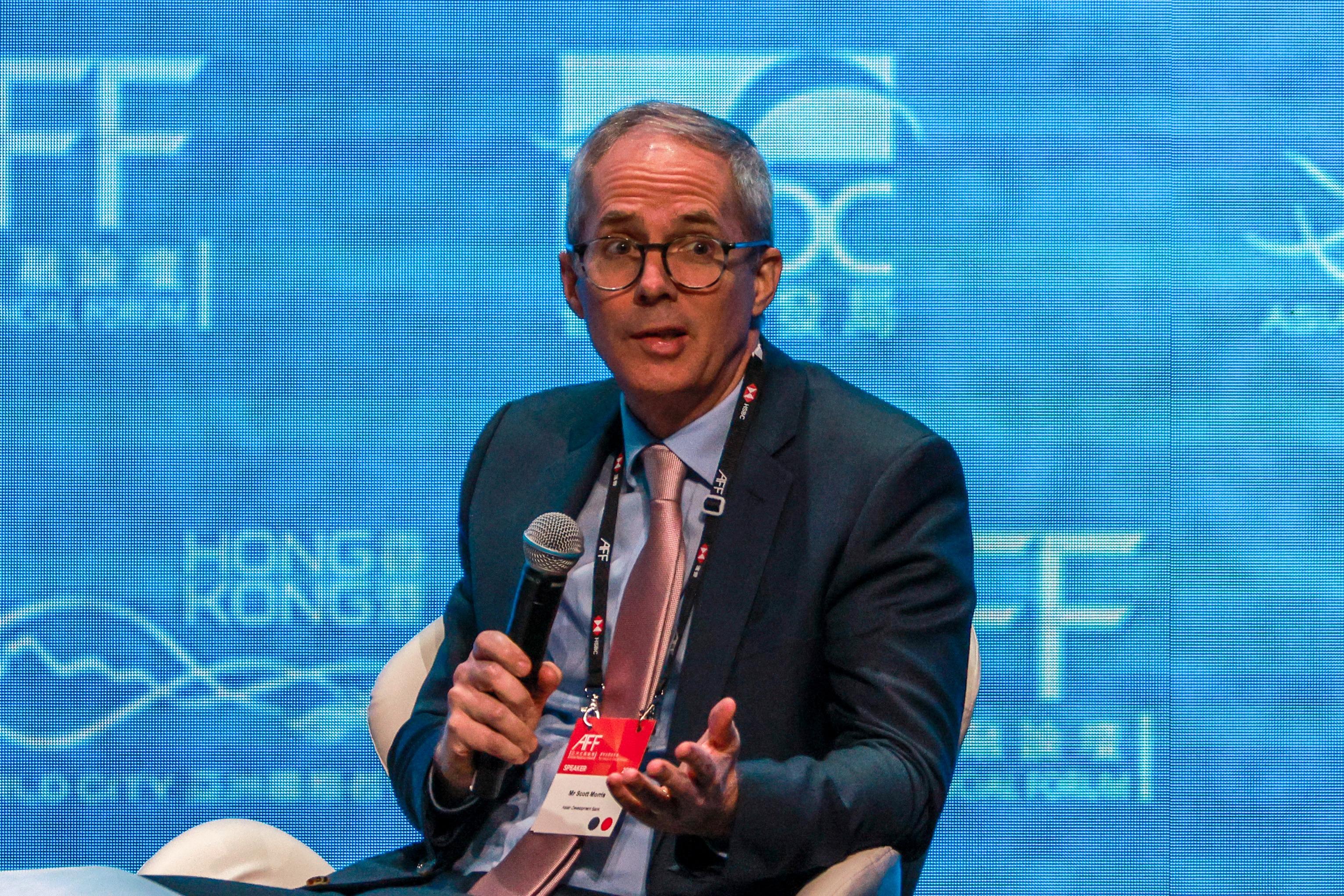 Asian Development Bank Vice-President (East and Southeast Asia, and the Pacific) Scott Morris speaks during the Policy Dialogue – Towards International Economic and Financial Cooperation in the Asian Financial Forum at Hong Kong Convention and Exhibition Centre in Wan Chai, Jan 24, 2024. (ANDY CHONG / CHINA DAILY)
Asian Development Bank Vice-President (East and Southeast Asia, and the Pacific) Scott Morris speaks during the Policy Dialogue – Towards International Economic and Financial Cooperation in the Asian Financial Forum at Hong Kong Convention and Exhibition Centre in Wan Chai, Jan 24, 2024. (ANDY CHONG / CHINA DAILY)
Scott Morris, vice-president for East Asia, Southeast Asia, and the Pacific at the Asian Development Bank, explained the ADB’s active role in pushing the climate financing effort and the importance of international collaboration.
ALSO READ: Greater regulatory cooperation needed to manage wealth
The ADB’s climate ambition for the next decade means a commitment to $100 billion of direct financing by 2030 to support climate goals.
To be clear, that is working with ADB’s members in addressing climate mitigation” he said.
Morris added that equally important for all ADB members are the investments in climate adaptation and resilience, with the latter becoming central to everything, noting that this appears to be a moment for change.
Contact the writer at vivienxu@chinadailyapac.com


